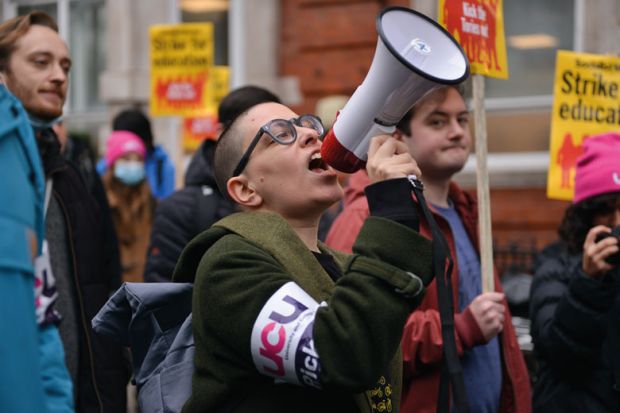The UK’s University and College Union has announced plans to hold another round of strike ballots but, while it may feel to many like Groundhog Day, the polls are being held in markedly different circumstances to the last time members were asked to have their say, just a few months ago.
The near constant presence of the secretary general of the National Union of Rail, Maritime and Transport Workers, Mick Lynch, during the summer’s rail strikes is emblematic of how unionism and workers’ rights is enjoying far greater attention than it has done in decades.
Many have been won around to the unions’ cause in large part because of the worsening cost-of-living crisis that is placing a strain on pay packets in every sector and makes arguments about the need for wage increases much more acute.
This new context could prove pivotal as UCU holds its first aggregated ballot of the dispute, meaning 50 per cent of the 80,000 polled must vote so that the union can legally take action en masse at 149 institutions, potentially instigating far more disruptive strikes than the patchy walkouts delivered by disaggregated, campus-by-campus polls over recent years.
UCU is attempting to position academics’ struggle against pension cuts and precarity as part of a much bigger societal fightback. Indeed, it seems likely lecturers would be joined on any picket lines by hundreds of cleaners, security guards and catering staff, as Unison is also balloting its higher education members.
“The feeling is that more colleagues are in despair about their futures. All the previous anguish about pay, pensions, and job security has become much worse very quickly due to the surge in inflation and the government’s inaction,” said Roger Seifert, emeritus professor of industrial relations at Wolverhampton University – one of the institutions that has announced plans to axe hundreds of jobs since the last ballot was held.
Switching to aggregated ballots is a risky strategy, since failing to hit the turnout threshold nationally would mean no action could take place. In the most recent pensions strike ballot, aggregated turnout was 49.9 per cent, while the figure for the latest pay and working conditions vote was 46.3 per cent.
But Dave Hitchcock, senior lecturer in early modern history at Canterbury Christ Church University, and one of those who advocated the union switch to aggregated ballots, said he was confident that the threshold could be reached as members will be incentivised to turn out because of the “dire wider economic context, studied intransigence of employers, evisceration of pensions and the 20 per cent deterioration in average pay over the past decade”.
Alongside attempts to capitalise on this growing sense of discontent, UCU has also been galvanised by its branches securing small wins with their institutions at the conclusion of the last academic year in return for ending a marking boycott, showing that progress is possible despite many years of deadlock. In what may prove the most significant development, the Open University brought 4,800 associate lecturers off insecure contracts and into permanent, better-paid roles.
Such positivity is important given the disillusionment many members were expressing in the spring when the union was racked by internal divisions. The last set of strikes had to be cancelled and many branches pulled out of the marking boycott at the last minute, citing fatigue among members and concerns about the effect of further disruption on students.
But while the context has changed, the scale of the challenge is the same. UCU has resisted calls to slim down its long list of demands and remains committed to tackling casualisation, workloads, gender and race pay gaps as well as securing a bigger pay rise than the 3 per cent offered by employers, and reversing pensions cuts.
Professor Seifert said a sense of “hopelessness that anything can be done” will still be a major factor that could hinder turnout, as well as “worries about making a bad situation worse and a general lack of interest”.
Professor Seifert said that the union’s messaging will prove key. “The campaign will matter, and recent labour movement history suggests a clear message to the point is what is required. [There should be] no nuance and no holding back. This is ‘do or die’ for the strike campaign, and the communications need to be short and brutal,” he said.
Dr Hitchcock said that, if the ballot is won, it would herald a “step change” in the disputes and a “more productive push towards meaningful negotiations”.
But he agreed that the union was reaching something of a crunch point, given the “dire shape” of the sector. “Short of this aggregate strike ballot I don’t know what else workers in HE could do to try to turn it around,” he said.
Register to continue
Why register?
- Registration is free and only takes a moment
- Once registered, you can read 3 articles a month
- Sign up for our newsletter
Subscribe
Or subscribe for unlimited access to:
- Unlimited access to news, views, insights & reviews
- Digital editions
- Digital access to THE’s university and college rankings analysis
Already registered or a current subscriber? Login








